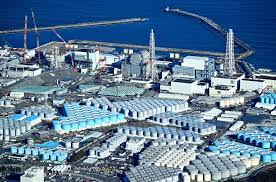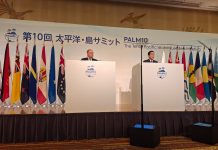By Shayal Devi
A deep care and affection for the ocean is deeply ingrained in all Pacific Island dwellers and they have made combined efforts to sustainably maintain this precious resource for future generations.
Today, a widely condemned plan of action adopted by one of Fiji’s longstanding partners threatens to jeopardise years of advocacy and diplomacy.
Japan made headlines recently for its decision to dump about 800,000 tonnes of radioactive wastewater from the damaged Fukushima Daiichi nuclear power plant into the Pacific Ocean.
This move has been heavily criticised by neighbouring nations, in particular Pacific Island Countries (PICs), because of the long-term impacts it may wreak on the ecosystem.
The topic was one up for discussion when Deputy Prime Minister and Minister for External Trade Manoa Kamikamica moved a motion for Parliament to support the Pacific forum leaders’ desire to secure our Pacific Ocean’s future and condemn any action that would threaten it.
Additionally, he was calling on Parliament to support calling on partner governments, including international agencies, to ensure the protection of the oceans and its resources.
In an unprecedented move, the motion was unanimously supported by both sides of the House.
In his motion, Kamikamica said as guardians of the ocean, our way of life was underpinned by the ocean.
“Our culture, food, livelihood and national economy rely on our oceans,” he said.
“I am hoping that this august Parliament will in one loud and clear voice send a message.
“The Pacific Ocean should not be seen as an easy and convenient dumping ground for unwanted and dangerous material and waste that other bigger nations produce and would not want to use in their own ecosystems.”
“Notorious” nuclear legacy
The Pacific is no stranger to nuclear testing, as evidenced in a Time Magazine article dated February 6, 2023, which stated that other countries have historically treated the Pacific as a “dumping ground” for their waste.
“The U.S conducted 67 nuclear tests in the Marshall Islands between 1946 and 1957 — and disposed of atomic waste in Runit Dome, where it’s still stored,” the article stated.
“That testing led not only to forced relocations but also to increased rates of cancers. Today there is concern that the dome is leaking and that rising sea levels might impact its structural integrity.
“France also conducted 193 nuclear tests from 1966 to 1996 at Mururoa and Fangataufa atolls in French Polynesia.”
Keeping the statistics in mind, Kamikamica also raised a point during the discussions — if the treated nuclear wastewater was so safe, why do they not use it on their own farms in their own country?
“We, as the Pacific, cannot continue to be made the dumping ground of the socalled bigger nations,” he said.
“Needless to say, coastal communities survive on marine life, not to mention the impact of radioactive chemicals that can have on our people.
“Internationally, Fiji is recognised as a popular tourism destination and wellknown for its sun, sand and sea. If this release occurs, there may be an impact on our tourism earnings. We cannot let this happen. We have to protect what is ours.”
Interlinked impacts
Fiji enjoys one of the most diverse forest ecosystems, complete with beaches, mangroves and over 10,000 kilometres of coral reefs.
This ecosystem is also home to 1200 fish species, 800 different species of molars and 350 hard coral species.
Fiji’s National Ocean Policy also emphasised the estimated value of the country’s marine ecosystem services was about $2.4 billion (US$1.2 billion) annually, with fisheries estimated to contribute $123 million (US$61.5 million) annually from subsistence farming.
This was highlighted by Minister for Transport, Infrastructure and Public Works Ro Filipe Tuisawau, who also said small inshore commercial fisheries produced a total national value of up to $54m (US$27 million).
Additionally, commercial offshore fisheries based on albacore tuna produced a total net of $20m (US$10 million) per annum.
As such, he said nuclear waste dumping was not just normal pollution. It would affect the food chain too.
Ro Filipe also said there were numerous parties objecting and opposing the proposed plan by the Japanese Government.
“There have been various opinions expressed on this, not only in the international media but closer to Japan.
“For example, there was one opinion in the Korean news agency stating that there are, at least, five options for dealing with nuclear contaminated water from the Fukushima Nuclear Plant, including evaporating and storing it underground.
“But the Japanese Government chose the cheapest and fastest way and it has not prioritised reducing the damage to human health.
“There is also the opinion that the Japanese Government has ignored domestic and international opposition in terms of dumping of contaminated water and it is putting ahead economic interest.”
“Largest space, smallest voice”
Fiji’s exclusive economic zone (EEZ) spans over 1.29 million square kilometres, yet it becomes quite burdensome to surveil the entire area considering Fiji’s limited resources and manpower.
Opposition member of Parliament Faiyaz Koya said this request in particular, was made by Japan, who were friends and development partners.
“You must remember for years and years, we in the Pacific Islands, have been in control of some of the largest ocean in the world, but we always have the smallest voice,” he said.
“In any forum, we were stepped on, moved aside — no more! We cannot let this happen. We must not let this happen. It is imperative upon us. We do not need the scientific results on this. We have to be the protectors of our ocean.
“We have to ensure that our future generations are protected. And the honourable minister is actually correct.
“If in their opinion, it is safe to do so, what is the harm in the release in their rivers and streams? Why our Pacific Ocean? That is the question.”
Walk the talk
As a leader in the Pacific, Fiji needs to stand at the helm of any plan to protect our oceans.
And Opposition MP Ketan Lal commended Fiji’s firm stand in its decision to ban nuclear waste dumping in its waters. He stated that Fiji had taken steps to ensure that water surrounding it was free from nuclear waste.
“There has always been a ban on the entry of any ship carrying radioactive material into our waters,” he said.
“The ban includes ships carrying nuclear waste, ships used in nuclear tests and ships carrying radioactive material for research purposes.
“Fiji’s stand to ban nuclear waste dumping is commendable as it shows its commitment towards protecting the environment and marine life. Fiji should not compromise on the safety of its people and the environment.”
According to Lal, the ban on nuclear waste dumping was an essential step towards a sustainable future. He pointed out that it was crucial for other PICs to follow Fiji’s example and take steps to prevent nuclear waste disposal in the ocean.
“The oceans are one of our planet’s most valuable resources and we must protect them from any harm caused by human activities, including nuclear waste dumping.
“The best way forward is for the Coalition Government to continue with the work FijiFirst has done to further strengthen its partnership with international agencies and governments.
“By working together, we can ensure the protection and preservation of our oceans and resources for the future generation,” he said.
SOURCE: FIJI TIMES/PACNEWS


















